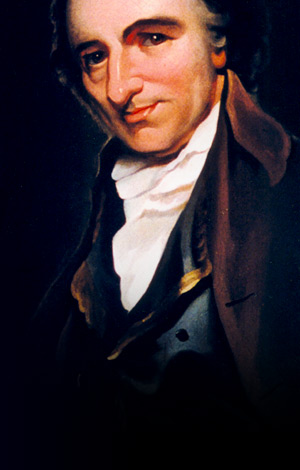Articles
Tom Paine: Lover of Deity and Man
“ The duty of man…is plain and simple and consists but of two points. His duty to God, which every man must feel; and with respect to his neighbor, to do as he would be done by.”
– Tom Paine
“ Let knowledge grow from more to more, But more of reverence in us dwell.”
– Alfred, Lord Tennyson
Tom Paine was a genuine Theophilanthropist – an ardent lover of God and Man. Deity, to Paine, was omni-radiant as well as transcendent and mankind was its only conscious mirror. Because of his ardent conviction in the immortality of the human soul, equality was the radical reference point of Paine’s luminous thought, the unfailing touchstone of his heart. Whereas most religious thought of his day could only praise God by maligning man, Paine implicitly raised humanity into the infinite potential of the Godhead through celebrating the numinous capacity of reason to discern the laws of God in Nature. Man is, in some sense, God in miniature; God is, conversely, the Original Man.
To Paine, the true test of our living awareness of the Infinite Presence is the purity and amplitude of our reason, its capacity to courageously entertain fresh solutions to the compelling needs of our age. Paine’s vast powers of intellection seemed to reach beyond the confines and contradictions of the ordinary to that of the free, unifying spaces of the uncircumscribed infinite. It is as though his great heart assimilated his reason into itself and, in so doing, converted it into the winged harbinger of pure imagination and enlightened understanding. America, to Paine, was as much an enduring vision as a place, an act of utopian imagination as a promise of political and religious liberty. Paine, in his timely writings, continually released from the Olympian heights lightening bolts of insight that both illuminated minds and inspired hearts. It is no wonder that he remarked that he never put pen to paper without his soul being present. It is no wonder that dispirited Revolutionary soldiers sitting around campfires, shoeless and cold, could be warmed and their warrior spirits raised by listening to Paine’s clarion call to heroic action. Clearly, those who suffer for a worthy cause know the voice of authenticity when they hear it. It reawakens their initial enthusiasms and reminds them of the sublime purpose of their trials. It is no mean task to be the Muse of the American Everyman and Paine was such to many a foot soldier and fledgling free thinker in the emerging Republic of Conscience.
To Paine, all minds are ultimately fueled by the heart and soul. A heart, whole and pure, eventually gives birth to a mind that is both focussed and expansive. Thus, Paine’s own thought is penetrating as well as fervent because so deeply rooted in the creative energy of celestial Truths. He speaks at all times in the ‘accents of the gods’ who wish above all to admit aspiring immortals into their divine society. But such exalted citizenship has its moral requisites. To Paine, an adopted perspective, a stated standpoint was the product of a choosing mind, and, as such, the thinker must be held accountable for his theory as well as his practice. All philosophies tell us something of the character of the philosopher. It indicates where he stands on the ladder of being, whether high or low, wise or ignorant, divine or demonic. Thus, when defeating an erring argument Paine often exposed the man. A selfish or narrow opinion is either the product of an ignorant mind or a perverse one. If a thinker cannot take care to see the implications of his position for the welfare of mankind, he deserves moral as well as intellectual instruction. A man must properly align his heart and mind if he intends to enter into a dialogue for the public good. Discourse on the common welfare must be assessed ultimately in the language of the Good, and, in the final analysis, enfolded into the empyrean of universal ethics, the only true abode of the divine thinker, the possessor of enlightened reason. It is no wonder that Paine could not easily tolerate fools. Too much is at stake when we stand in the midst of the commonwealth and propose prospective courses of action for future generations. This is especially true during those magical moments of history when mankind stands at a cross road of choice and needs to see clearly which road leads to the Promised Land and which to perdition. To Paine, you either speak in the cadences of community and compassion or you keep your silence.
Clearly, Paine felt that men who share an authentic commitment to social harmony may, and often do, genuinely disagree. But their moral sincerity is crystal clear and evident to all. Their thoughts radiate from the center of their moral consciousness to its all-embracing circumference with both directness and wit. They are fearless in voicing their convictions as well as their doubts in the company of tried and trusted companions. They are also quick to acknowledge a more salient truth than their own when it is shown to throw more light on proposed actions to advance the common cause. They are able, in the magic of the harmonic moment, to rise above their lesser selves and participate in the creative dialectic of self-canceling, benevolent visualization. In the very activity of creative encounter, such men and women freely salute greatness in their midst no less than they expose foolishness to the common light of reason.
The question of the coming years is not so much who will be the American President, but will any President have the courage to love America more than he worships himself, his party or the image of his legacy? When the future of a nation and the globe is at stake, Truth must sit on the royal throne and not those ignorant pretenders, Prudence and Patriotism. But, alas, all modern presidents and prime ministers are surrounded by confidants who cherish public approval and party more than they do candor and the common weal. And, as Shakespeare intimates in “King Lear”, the ubiquitous court Fool is often wiser and more aware than many an ambitious or sycophantic advisor. Who will then be worthy in 2016 to sit upon the dais of America, who capable of guiding the ship of state from the oft polluted deck of the Oval Office? Which of the candidates for the Presidency will be capable, in a Tolstoyian sense, to conspire or ‘breathe together’ with other like-hearted individuals for the greater Good? Which ones will be able to think ethically and act fearlessly and cleanly? And, who might be that unknown Fool who will sing quietly into the expectant ear of the next President the poignant melodies of a desperate humanity longing for America to live up to the promise of its invisible Seal: “My country is the world and my religion is to do good.”?
The American Dream is not meant for the few nor for the many, but for all. It is an ever radiant vision of human and humane ends, of self-determined initiatives for the ever-evolving common good that ultimately reaches beyond territories and creeds. It is a democracy of abundance that is only redeemed when it is shared. America indeed stands for wealth and power but not of money and position, rather of service and opportunity for all. America is, as post-WW II Europe understood, a beacon of hope for the forlorn, a promise of deliverance for the seemingly unregenerate, and -- above all – the freedom to pursue excellence in every sphere of life. This was and is the living legacy of Tom Paine, the ardent lover of God and Man, the true Theophilanthropist and member of that invisible community that loves the true, the beautiful and the just.
Jim Tepfer
The above is a revised and updated article which first appeared in the "Bulletin" of the Thomas Paine Friends Society in January 2005.


